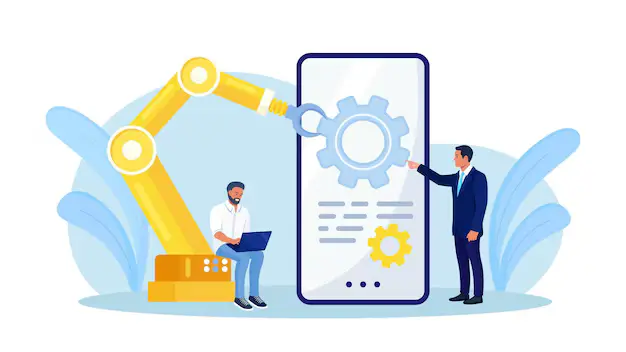Introduction: What is CMMS Skills?
Maintenance processes are optimized in a fast-paced industrial and commercial environment by having advanced CMMS skills for better asset reliability and lower operational costs. The software ensures effective maintenance management of work orders, asset tracking, preventive maintenance scheduling, inventory control, and data analysis without interruptions.
In this article, we will explore “What is CMMS Skills“, their key components, and who needs them to maximize the benefits of CMMS software.
Click Here to Train Your Team for Effective CMMS Use ✔

What is CMMS Skills?
CMMS skills refer to the ability to effectively use a Computerized Maintenance Management System (CMMS) to manage maintenance activities, equipment, and resources efficiently. These skills are crucial for maintenance management, asset tracking, and operational efficiency professionals.
Learn: CMMS vs Traditional Maintenance: Why Make the Switch?
Mastering CMMS skills enables businesses to:
- Improve equipment uptime and reliability ✔
- Reduce unexpected breakdowns and downtime ✔
- Streamline work order management ✔
- Optimize inventory control and spare parts management ✔
- Generate detailed maintenance reports for data-driven decisions ✔
Key CMMS Skills for Maintenance Professionals
1. Work Order Management
One of the most important CMMS skills is effectively managing work orders to ensure timely and efficient maintenance. A robust CMMS software allows users to:
- Create, assign, and track work orders in real-time
- Automate recurring tasks for preventive maintenance
- Prioritize urgent repairs to minimize downtime
- Attach images, manuals, and technician notes for better troubleshooting
- Monitor work order completion rates to assess operational efficiency
2. Asset Tracking and Management
Effective asset management is a core function of CMMS software. CMMS skills enable maintenance teams to:
- Maintain a centralized database of all equipment and assets
- Track asset location, condition, and maintenance history
- Use barcode or RFID technology for easy asset identification
- Monitor asset performance to predict potential failures
- Plan asset replacement based on lifecycle data
3. Preventive Maintenance Scheduling
Preventive maintenance (PM) reduces unexpected failures and extends equipment life. Professionals with strong CMMS skills can:
- Set up automatic service schedules based on time or usage
- Ensure compliance with maintenance schedules to reduce breakdowns
- Assign tasks to technicians with clear instructions
- Analyze preventive care effectiveness through CMMS reports
4. Inventory and Spare Parts Management
Managing spare parts inventory is crucial for uninterrupted maintenance operations. A CMMS allows users to:
- Track spare parts usage and availability in real-time
- Set automated reorder points to prevent stock shortages
- Optimize inventory costs by reducing excess stock
- Integrate vendor management for easy procurement of parts
5. Data Analysis and Reporting
CMMS software provides valuable insights through maintenance reports and analytics. Professionals proficient in CMMS can:
- Generate detailed reports on work order completion, asset downtime, and operational costs
- Identify trends in equipment failure to improve maintenance strategies
- Monitor key performance indicators (KPIs) such as MTBF (Mean Time Between Failures) and MTTR (Mean Time to Repair)
- Ensure compliance with safety regulations through service logs
6. Technical Knowledge of Maintenance Operations
While CMMS software simplifies maintenance, having a technical understanding of equipment and systems is essential for:
- Diagnosing equipment issues accurately
- Understanding failure patterns and preventive measures
- Implementing best asset management practices
- Ensuring compliance with safety and industry regulations
7. Communication and Team Collaboration
CMMS enhances communication across maintenance teams, ensuring seamless collaboration between:
- Technicians, managers, and vendors for efficient task execution
- Operations and production teams to avoid workflow disruptions
- Management and stakeholders through detailed maintenance reports
Who Needs CMMS Skills?
Maintenance Technicians
CMMS skills help maintenance technicians:
- Access work orders and asset details instantly
- Log service activities and update job status
- Use QR codes to retrieve equipment history and manuals
- Ensure compliance with scheduled maintenance tasks
Maintenance Planners & Coordinators
Planners and coordinators use CMMS to:
- Schedule and assign preventive maintenance tasks
- Manage resources efficiently for seamless operations
- Optimize service schedules based on asset data
- Reduce operational disruptions through planned servicing
Maintenance Managers & Facility Managers
Managers rely on CMMS to:
- Monitor operational performance and efficiency
- Analyze asset health and make data-driven decisions
- Ensure compliance with safety and maintenance standards
- Manage maintenance budgets and cost optimization
Operations Managers & Production Supervisors
CMMS software helps operations teams by:
- Ensuring equipment reliability for smooth production
- Reducing downtime through predictive maintenance
- Coordinating with maintenance teams for operational efficiency
- Tracking maintenance costs to improve budgeting
IT & CMMS Administrators
IT teams ensure the CMMS system is:
- Properly configured for seamless integration
- Secure and updated with the latest software versions
- Accessible across mobile, desktop, and cloud platforms
- Integrated with IoT and AI technologies for smart maintenance
Why CMMS Skills Are Essential for Businesses
- Increases Asset Reliability: Ensures proactive maintenance to prevent equipment failures.
- Reduces Downtime & Costs: Helps organizations cut expenses by avoiding emergency repairs.
- Improves Compliance: Maintains detailed maintenance records for audits and regulatory requirements.
- Enhances Productivity: Streamlines workflows, allowing teams to focus on core operations.
Conclusion
All the specialists in maintenance, facility management, or business need to train in CMMS skills to derive the best from their asset management and improve operational efficiency. A well-implemented CMMS system with trained manpower goes a long way in taking an organization’s maintenance strategy by transforming it into low costs with uptime reliability and compliance.
If you’re looking to implement CMMS software or enhance your team’s CMMS skills, investing in proper training and best practices can make a significant impact on your organization’s success. Gaining CMMS experience ensures your team can fully utilize the capabilities of a Web-based CMMS software. With the flexibility and accessibility of a Cloud-based CMMS, your organization can streamline maintenance operations, improve asset management, and boost overall efficiency.
Frequently Asked Questions (FAQs)
The ability to efficiently manage work orders, preventive maintenance, and asset tracking are the most critical CMMS skills.
Regular training, hands-on experience, and staying updated with the latest CMMS software features can help improve CMMS skills.
Yes, CMMS skills help track expenses, optimize preventive maintenance, and reduce unplanned downtime, leading to significant cost savings.
Absolutely! From technicians to managers, proper CMMS training ensures efficient maintenance execution and decision-making.
Industries like manufacturing, healthcare, facilities management, energy, and transportation rely on CMMS for maintenance operations.
